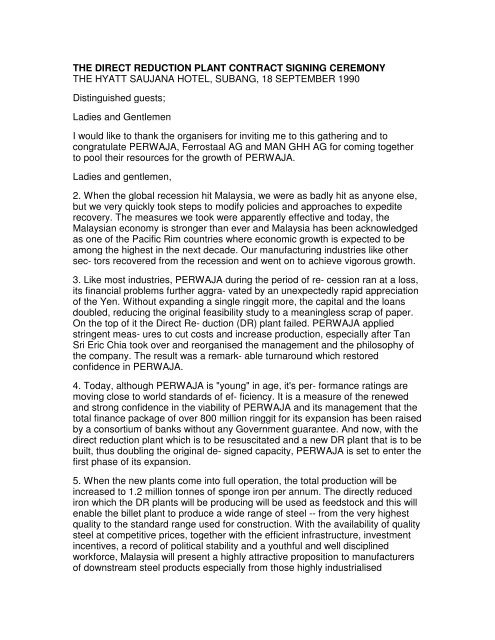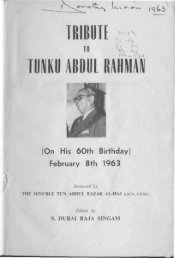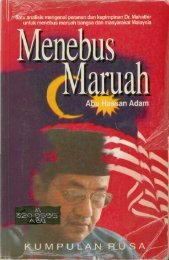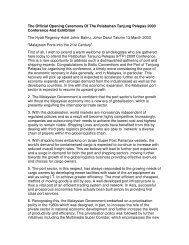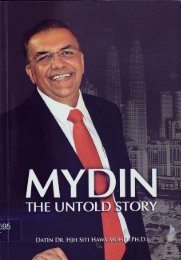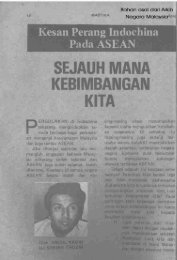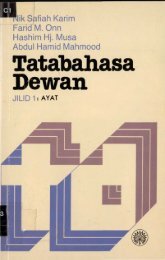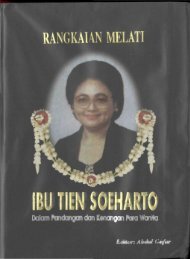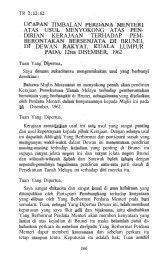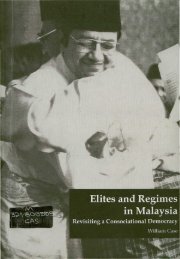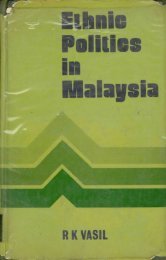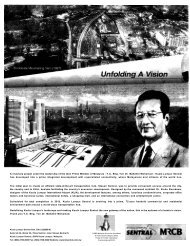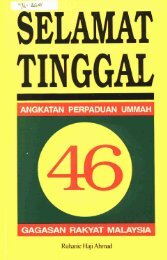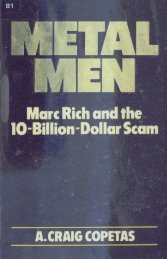THE DIRECT REDUCTION PLANT CONTRACT ... - Perdana Library
THE DIRECT REDUCTION PLANT CONTRACT ... - Perdana Library
THE DIRECT REDUCTION PLANT CONTRACT ... - Perdana Library
You also want an ePaper? Increase the reach of your titles
YUMPU automatically turns print PDFs into web optimized ePapers that Google loves.
<strong>THE</strong> <strong>DIRECT</strong> <strong>REDUCTION</strong> <strong>PLANT</strong> <strong>CONTRACT</strong> SIGNING CEREMONY<strong>THE</strong> HYATT SAUJANA HOTEL, SUBANG, 18 SEPTEMBER 1990Distinguished guests;Ladies and GentlemenI would like to thank the organisers for inviting me to this gathering and tocongratulate PERWAJA, Ferrostaal AG and MAN GHH AG for coming togetherto pool their resources for the growth of PERWAJA.Ladies and gentlemen,2. When the global recession hit Malaysia, we were as badly hit as anyone else,but we very quickly took steps to modify policies and approaches to expediterecovery. The measures we took were apparently effective and today, theMalaysian economy is stronger than ever and Malaysia has been acknowledgedas one of the Pacific Rim countries where economic growth is expected to beamong the highest in the next decade. Our manufacturing industries like othersec- tors recovered from the recession and went on to achieve vigorous growth.3. Like most industries, PERWAJA during the period of re- cession ran at a loss,its financial problems further aggra- vated by an unexpectedly rapid appreciationof the Yen. Without expanding a single ringgit more, the capital and the loansdoubled, reducing the original feasibility study to a meaningless scrap of paper.On the top of it the Direct Re- duction (DR) plant failed. PERWAJA appliedstringent meas- ures to cut costs and increase production, especially after TanSri Eric Chia took over and reorganised the management and the philosophy ofthe company. The result was a remark- able turnaround which restoredconfidence in PERWAJA.4. Today, although PERWAJA is "young" in age, it's per- formance ratings aremoving close to world standards of ef- ficiency. It is a measure of the renewedand strong confidence in the viability of PERWAJA and its management that thetotal finance package of over 800 million ringgit for its expansion has been raisedby a consortium of banks without any Government guarantee. And now, with thedirect reduction plant which is to be resuscitated and a new DR plant that is to bebuilt, thus doubling the original de- signed capacity, PERWAJA is set to enter thefirst phase of its expansion.5. When the new plants come into full operation, the total production will beincreased to 1.2 million tonnes of sponge iron per annum. The directly reducediron which the DR plants will be producing will be used as feedstock and this willenable the billet plant to produce a wide range of steel -- from the very highestquality to the standard range used for construction. With the availability of qualitysteel at competitive prices, together with the efficient infrastructure, investmentincentives, a record of political stability and a youthful and well disciplinedworkforce, Malaysia will present a highly attractive proposition to manufacturersof downstream steel products especially from those highly industrialised
countries where costs have esca- lated.6. This opens a whole new era of opportunities for PERWAJA in variousdownstream activities. For the nation it will mean that the true age ofindustrialisation has begun, for no country can really be considered asindustrialised if it lacks a reasonable capacity to produce and process steel.Although many new materials are used in modern products, steel remains thebasic material without which most modern capital and consumer goods cannotbe produced. It is there- fore important for Malaysia to acquire the capacity toproduce steel and to be efficient at it. The latter is es- pecially important becausemany old steel producers are go- ing out of business due to poor efficiency.PERWAJA's future depends not only on availability of plants but moreimportantly the skills in managing and operating them at maximum efficiency.Ladies and gentlemen,7. When Malaysia decided to go into heavy industries there was scepticism allround. To-day that decision has been vindicated. Apart from PERWAJA, themotor-car industry, tin-plate plant, cement plant, motor-cycle engine plants aswell as the Heavy Industries Corporation or HICOM itself have becomesuccessful and very profitable. And now PERWAJA too has posted its firstprofitable financial year. The move into heavy industry was essentially correct butGovern- ment apparently overestimated management capacity to handle thesesophisticated capital intensive industries. The mis- takes have been well learntand whether privatised or not, management skill must be given serious priority ifwe are not to fail again.8. Up till now the public sector has played a leading role in financing thedevelopment of heavy industries either di- rectly or through joint ventures withthe private sector. However greater private sector participation in such industrieswill be encouraged in future. The government will en- courage suchparticipation through privatisation or joint ventures between local and foreigninvestors. We hope the public sector participation will be reduced just to the levelof project identification and the creation of opportu- nities for private investments.Ladies and gentlemen,9. All of you present today have a role to play in the success of PERWAJA. It isthe flagship of our country's entry into the steel industry. It is my sincere hopethat everyone will give PERWAJA all the support it needs to make it a success.


